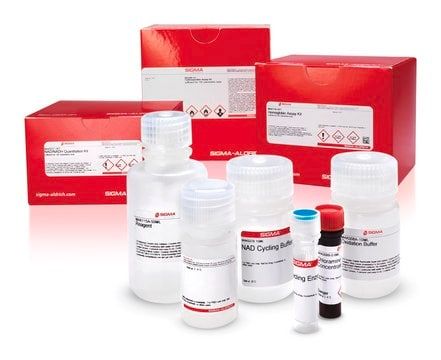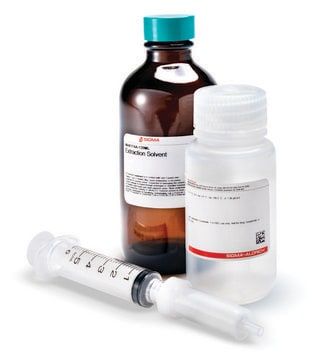MAK336
D-Lactate Assay Kit
sufficient for 100 colorimetric tests
Manufacturer: Sigma Aldrich
Synonym(S): D-Lactate Detection Kit
Select a Size
| Pack Size | SKU | Availability | Price |
|---|---|---|---|
| 1 KIT | MAK336-1-KIT | In Stock | ₹ 48,074.10 |
MAK336 - 1 KIT
In Stock
Quantity
1
Base Price: ₹ 48,074.10
GST (18%): ₹ 8,653.338
Total Price: ₹ 56,727.438
usage
sufficient for 100 colorimetric tests
input
cell medium serum plasma
detection method
colorimetric
relevant disease(s)
neurological disorders; gastrointestinal diseases
storage temp.
−20°C
Description
- General description: Lactate is generated by lactate dehydrogenase (LDH) under hypoxic or anaerobic conditions. Monitoring lactate levels is, therefore, a good indicator of the balance between tissue oxygen demand and utilization and is useful when studying cellular and animal physiology. D-lactate is produced in only minor quantities in animals and measuring for D-lactate in animal samples is a means to determine the presence of bacterial infection. Simple, direct and automation-ready procedures for measuring lactate concentration are very desirable.
- Application: The D-Lactate Assay Kit may be used for:Gastrointestinal Disease ResearchNeurological Disease Research
- Features and Benefits: Enhanced Detection Range: Detect D-Lactate levels accurately across a wide range, from 0.05 mM to 2 mM, using only 20 μL of sample in a 96-well plate setup, ensuring comprehensive analysis with minimal sample requirement.Simplified Process: Experience a streamlined process with the addition of only a single working reagent and a 20 minute room temperature reaction, reducing complexity and saving valuable time and effort.Compatibility with High-Throughput Systems: Easily incorporate our kit into high-throughput handling systems, ensuring smooth and accurate processing, enhancing efficiency in your laboratory workflow.
- Suitability: Suitable for D-lactate in serum, plasma, and cell media samples.
- Principle: The D-Lactate Assay Kit is based on lactate dehydrogenase catalyzed oxidation of lactate, in which the formed NADH reduces a formazan (MTT) Reagent. The intensity of the product color, measured at 565 nm, is proportionate to the lactate concentration in the sample. Detection limit of 0.05 mM and linearity up to 2 mM D-lactate in 96-well plate assay. For cell culture samples containing phenol red: detection limit of 0.1 mM and linearity up to 1 mM D-lactate in 96-well plate assay.
- Other Notes: For additional information on our range of Biochemicals, please complete this form.
SAFETY INFORMATION
WGK
WGK 2

